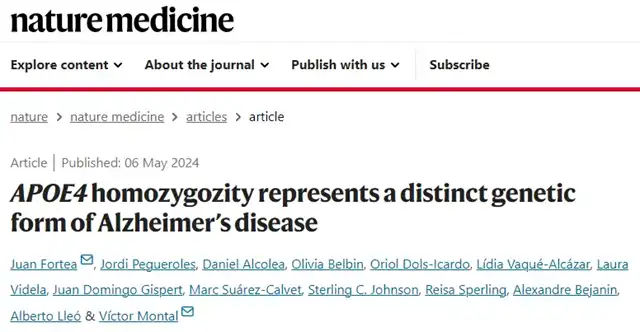Individuals Carrying Two APOE4 Copies Likely to Develop Alzheimer’s Disease Symptoms
- Normal Liver Cells Found to Promote Cancer Metastasis to the Liver
- Nearly 80% Complete Remission: Breakthrough in ADC Anti-Tumor Treatment
- Vaccination Against Common Diseases May Prevent Dementia!
- New Alzheimer’s Disease (AD) Diagnosis and Staging Criteria
- Breakthrough in Alzheimer’s Disease: New Nasal Spray Halts Cognitive Decline by Targeting Toxic Protein
- Can the Tap Water at the Paris Olympics be Drunk Directly?
Individuals Carrying Two APOE4 Copies Likely to Develop Alzheimer’s Disease Symptoms
- Should China be held legally responsible for the US’s $18 trillion COVID losses?
- CT Radiation Exposure Linked to Blood Cancer in Children and Adolescents
- FDA has mandated a top-level black box warning for all marketed CAR-T therapies
- Can people with high blood pressure eat peanuts?
- What is the difference between dopamine and dobutamine?
- How long can the patient live after heart stent surgery?
Individuals Carrying Two APOE4 Copies Likely to Develop Alzheimer’s Disease Symptoms
Almost all individuals carrying two copies of the APOE4 gene will develop symptoms of Alzheimer’s disease (AD), according to a study published in *Nature Medicine* by researchers from the Spanish Instituto de Salud Carlos III.
Alzheimer’s disease, commonly known as dementia, poses a significant global health challenge with high economic and social burdens. There are approximately 50 million cases of dementia worldwide, with about 10 million new cases annually. In China alone, there are millions of patients, making it the country with the highest number of cases globally. Despite considerable efforts in research, there are currently no highly effective treatment options for preventing or curing Alzheimer’s disease.
AD is a complex disease with genetic variations involving both rare and common genetic mutations. Mutations in three genes, APP, PSEN1, and PSEN2, can lead to early-onset autosomal dominant Alzheimer’s disease, while mutations in dozens of other genes are associated with an increased risk of late-onset AD. Among these genes, APOE is considered the strongest genetic risk factor. It is estimated that 2-3% of the global population carries two APOE4 copies.
Previous studies have shown that individuals with two APOE4 copies, known as APOE4 homozygotes, have a lifetime risk of developing AD reaching 60% by the age of 85, significantly higher than heterozygotes or non-carriers.
The recent study analyzed data from the National Alzheimer’s Coordinating Center in the United States and five large Alzheimer’s disease biomarker cohorts, including 3297 pathological research individuals and 10039 clinical research individuals. They found that almost all individuals carrying two APOE4 copies will develop symptoms of Alzheimer’s disease, with significantly higher levels of AD biomarkers starting from age 55 compared to APOE3 homozygotes. By age 65, almost all individuals have abnormal levels of amyloid proteins in their cerebrospinal fluid.

This suggests that having two APOE4 gene copies is not just a risk factor but also the underlying cause of the disease, representing a new genetic form of Alzheimer’s disease.
The researchers emphasized that the presence of two APOE4 gene copies not only increases the risk but also predicts the onset of Alzheimer’s disease, highlighting the need for specific prevention strategies.
In conclusion, having two APOE4 gene copies may represent a new genetic form of Alzheimer’s disease. These findings could help in developing personalized prevention strategies, clinical trials, and targeted treatment approaches for this specific population.
(source:internet, reference only)
Disclaimer of medicaltrend.org
Important Note: The information provided is for informational purposes only and should not be considered as medical advice.



